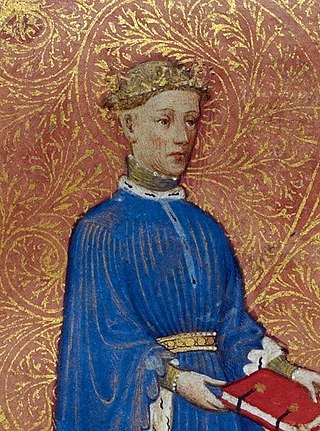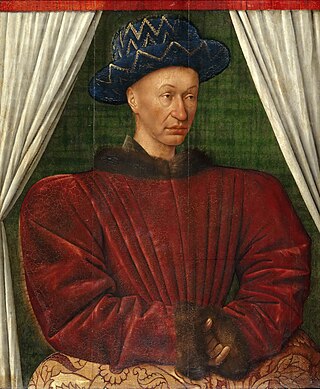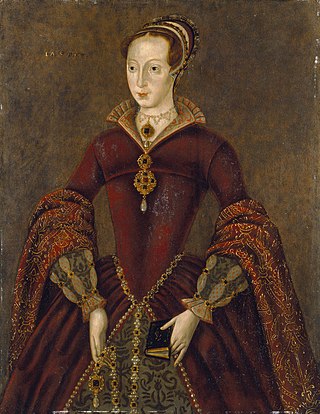| |||||
| Centuries: | |||||
|---|---|---|---|---|---|
| Decades: | |||||
| See also: | Other events of 1498 List of years in Ireland | ||||
Events from the year 1498 in Ireland include:
| |||||
| Centuries: | |||||
|---|---|---|---|---|---|
| Decades: | |||||
| See also: | Other events of 1498 List of years in Ireland | ||||
Events from the year 1498 in Ireland include:

Pope Celestine III, was the head of the Catholic Church and ruler of the Papal States from 30 March or 10 April 1191 to his death in 1198. He had a tense relationship with several monarchs, including Emperor Henry VI, King Tancred of Sicily, and King Alfonso IX of León.
Pope Gregory VI, born Giovanni Graziano in Rome, was bishop of Rome and ruler of the Papal States from 1 May 1045 until his resignation at the Council of Sutri on 20 December 1046.

The House of Tudor was an English and Welsh dynasty that held the throne of England from 1485 to 1603. They descended from the Tudors of Penmynydd, a Welsh noble family, and Catherine of Valois. The Tudor monarchs ruled the Kingdom of England and the Lordship of Ireland for 118 years with five monarchs: Henry VII, Henry VIII, Edward VI, Mary I and Elizabeth I. The Tudors succeeded the House of Plantagenet as rulers of the Kingdom of England, and were succeeded by the Scottish House of Stuart. The first Tudor monarch, Henry VII, descended through his mother from the House of Beaufort, a legitimised branch of the English royal House of Lancaster, a cadet house of the Plantagenets. The Tudor family rose to power and started the Tudor period in the wake of the Wars of the Roses (1455–1487), which left the main House of Lancaster extinct in the male line.
Year 1422 (MCDXXII) was a common year starting on Thursday of the Julian calendar.

Henry V, also called Henry of Monmouth, was King of England from 1413 until his death in 1422. Despite his relatively short reign, Henry's outstanding military successes in the Hundred Years' War against France made England one of the strongest military powers in Europe. Immortalised in Shakespeare's "Henriad" plays, Henry is known and celebrated as one of the greatest warrior-kings of medieval England.

Henry VI was King of England from 1422 to 1461 and again from 1470 to 1471, and disputed King of France from 1422 to 1453. The only child of Henry V, he succeeded to the English throne upon his father's death, at the age of nine months; and succeeded to the French throne on the death of his maternal grandfather, Charles VI, shortly afterwards.

Henry the Lion, also known as Henry III, Duke of Saxony and Henry XII, Duke of Bavaria, was a member of the Welf dynasty.

Charles VII, called the Victorious or the Well-Served, was King of France from 1422 to his death in 1461. His reign saw the end of the Hundred Years' War and a de facto end of the English claims to the French throne.

Charles VI, nicknamed the Beloved and later the Mad, was King of France from 1380 until his death in 1422. He is known for his mental illness and psychotic episodes that plagued him throughout his life.

John Kemp was a medieval English cardinal, Archbishop of Canterbury, and Lord Chancellor of England.

Humphrey of Lancaster, Duke of Gloucester was an English prince, soldier and literary patron. He was "son, brother and uncle of kings", being the fourth and youngest son of Henry IV of England, the brother of Henry V, and the uncle of Henry VI. Gloucester fought in the Hundred Years' War and acted as Lord Protector of England during the minority of his nephew. A controversial figure, he has been characterised as reckless, unprincipled, and fractious, but is also noted for his intellectual activity and for being the first significant English patron of humanism, in the context of the Renaissance.

Barfleur is a commune and fishing village in Manche, Normandy, northwestern France.

The House of Normandie designates the noble family which originates from the Duchy of Normandy and whose members were dukes of Normandy, counts of Rouen, as well as kings of England following the Norman conquest of England. It lasted until Stephen of the French House of Blois seized the English throne and the Duchy of Normandy in 1135. The house emerged from the union between the Viking Rollo and Poppa of Bayeux, a West Frankish noblewoman. William the Conqueror and his heirs down through 1135 were members of this dynasty while nearly every English monarch since William have been his descendant.

Lady Jane Grey, also known as Lady Jane Dudley after her marriage and as the "Nine Days' Queen", was an English noblewoman who claimed the throne of England and Ireland from 10 to 19 July 1553.
Events from the year 1449 in Ireland.
Events from the year 1457 in England.
Events from the year 1451 in Ireland.
Events from the year 1447 in Ireland.
Events from the year 1431 in France
Events from 1566 in the Kingdom of Scotland.